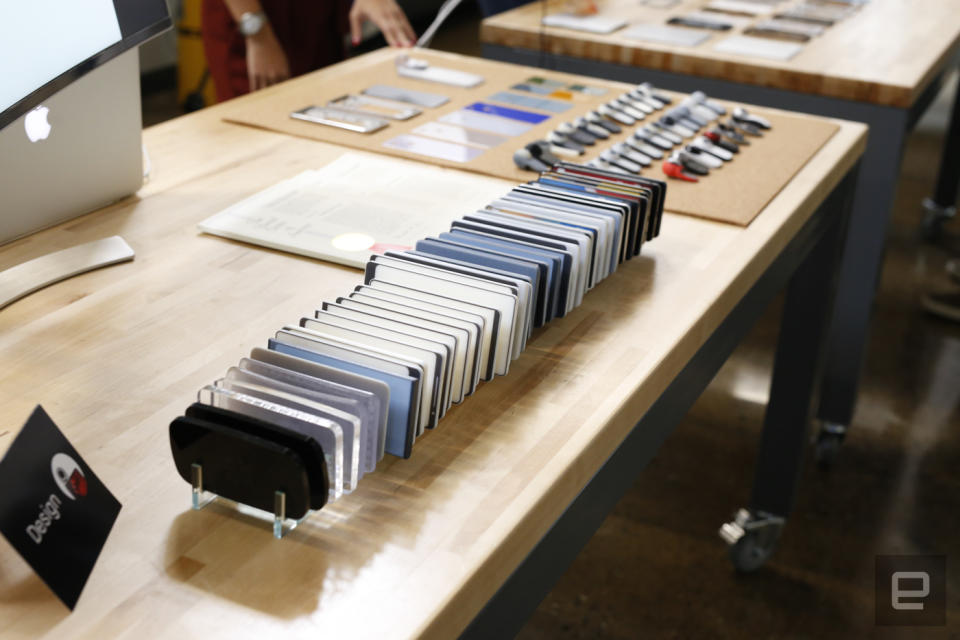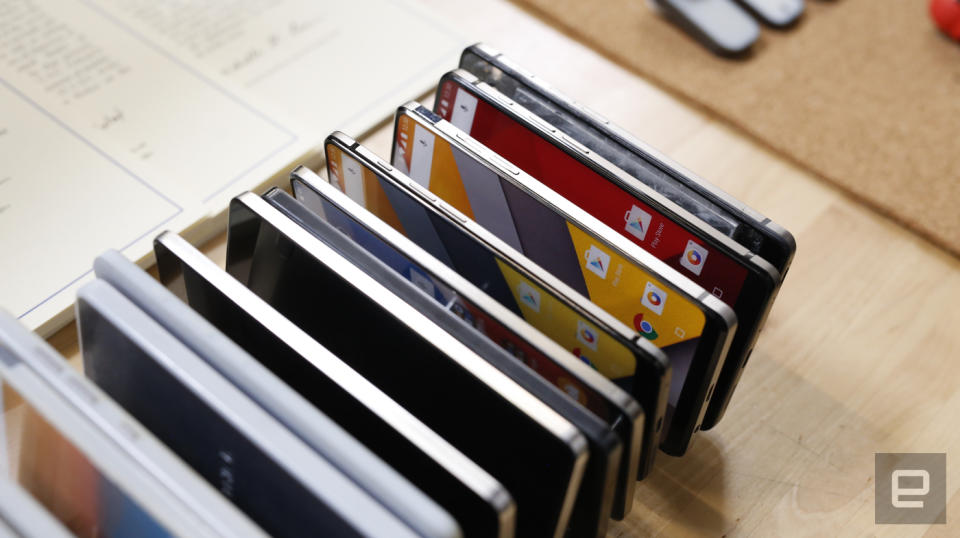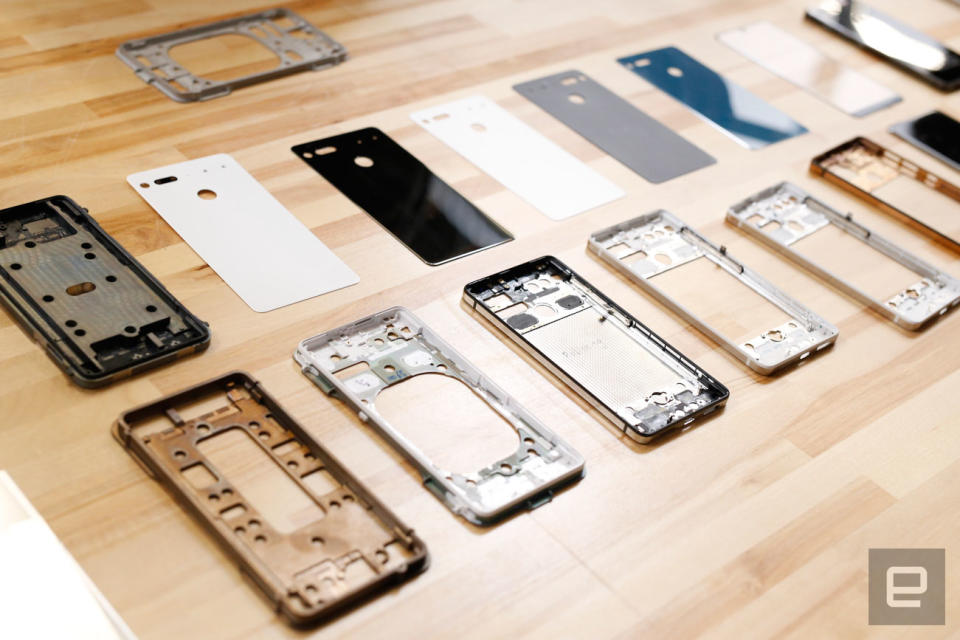Essential's startup advantage might come back to haunt it
Andy Rubin's Essential can be more agile and innovative than the big guys. But will that be enough?
"Most companies would get a stage, and we'd have lights and music and everything else," joked Andy Rubin as he addressed a group of reporters. "But that really isn't our style." He was casually dressed in jeans and a blue T-shirt with a coffee mug in one hand as he stood in a lobby-like room. The setup was located just a few feet from an adult-size slide and overlooked a farm of cubicles on one side and a cafeteria on the other. It wasn't the typical setting for a major product launch.
But a product launch it was. We were gathered at Playground Global -- a startup incubator that Rubin founded after he left Google -- for the unveiling of what is perhaps his most important creation since Android. It is the PH-1, the first smartphone from his new company, Essential, which itself was hatched out of Playground. This is the phone (and company) that Rubin thinks is innovative enough to take on big players like Apple and Samsung. But as big a name as Rubin is -- you don't get much bigger than the founder of Android -- the question remains whether the plucky startup can really take on the smartphone Goliaths (It wouldn't be the first to try.)
Essential was created 18 months ago, and it was born out of frustration. Playground Global invests mostly in hardware companies, and over time, Rubin and his team started to notice that certain companies just didn't seem to exist. "What are the deals that aren't coming in through the front door?" Rubin wondered. "What are the companies that we think should exist based on our experience and our expertise, but that we're not seeing?" And because they didn't see a phone company, they went ahead and created one themselves.

"Fundamentally, people [on the team] were unhappy with a lot of the products they were using in their daily lives," Rubin said. "Smartphones were just kind of incremental. It's a saturated market." What especially concerned Rubin was that there were only really two players in the industry: Apple and Samsung. "Everybody else kind of rolls off into the long tail."
In a blog post published in May, Rubin wrote about a late-night conversation he had with a friend, wherein they commiserated about the current state of technology, including the lack of choice and the abundance of unnecessary features.
"I am partly responsible for all of this," he wrote. "For all the good Android has done to help bring technology to nearly everyone, it has also helped create this weird new world where people are forced to fight with the very technology that was supposed to simplify their lives. Was this what we intended? Was this the best we could do?"
"That's not how the auto industry works," Rubin said at the recent media event. It's rare that you would have the same car as everyone else, he continued. With phones, however, it seems that for most people, the choice boils down to one of two companies. "What went wrong, where we only have two choices?"

Essential, in contrast, is about choice, Rubin says. And he believes that because Essential is a small and nimble startup, it can achieve customer satisfaction in a way that the big companies can't. "It's a company for its customers, and we'll never lose track of that."
One example of this is that Rubin wants customers to feel like the devices are their own to use as they please. "They should feel a great ownership of it," he said. "We're not going to force anything down the consumer's throat." For example, he says, a company shouldn't force a specific music service on you when you buy a phone. "I don't need someone else's music service shoved on my phone because it's some business opportunity."
Rubin also believes that Essential should have an open-source philosophy, which is why the phone runs on pure, unadulterated Android. The company is also preparing to launch Essential Home -- an Echo-like device that runs on Ambient OS and is also open source. Indeed, this Home device is compatible with existing voice assistants like Siri, Google Assistant and Alexa -- so long as their respective makers are willing to play nice with Essential's hardware. That's not to say the company won't eventually develop its own voice assistant -- there are hints that it probably will -- but even then, Rubin and team want you to use the assistant you're most comfortable with.
Another underlying tenet of Essential is that premium materials should not be unaffordable. This was made evident to us as we toured Playground's Hardware Lab, which is where companies are invited to make prototypes of their hardware ideas. We were shown first-hand how the PH-1 was built, and why the PH-1 is made out of titanium and ceramic, some of the most luxurious and durable materials ever used in a mass-market phone.

This, Essential is proud to say, is not the kind of thing that an Apple or Samsung could possibly do. The reason is because machining titanium is often expensive and the process of crafting the perfect ceramic shell is hugely time-consuming. Essential's trick is to find ways around it. The company found a small German shop that could make titanium shells out of injection molds instead of milling. As for ceramic, the company is able to make the phones at a much smaller scale, and so, therefore, doesn't require as many resources. Of course, big companies like Apple could certainly try to make products at a small scale too -- perhaps as a limited edition release -- but sometimes a material is so difficult to work with, it often isn't economically wise to do so.
"The challenge with ceramic is that it's like pottery," wrote head of industrial design Linda Jiang in a blog post published in May. "You have to fire it, and when you do, the material shrinks 25 percent." What's more, she told reporters that the color-matching in ceramic is not like that of paint -- a red and blue won't necessarily give you purple. With ceramics, that mix could result in an entirely different color altogether. Plus, each color has to be baked in its own oven, which is basically its own building. "We spent months and months, but we eventually homed in on a process that allowed us to get costs down to the point where it's both feasible and flawless," she wrote.
Scott Croyle, the chief design and product officer of Nextbit, had positive things to say about Essential (Nextbit is the startup company behind Robin, an Android phone with cloud integration). Croyle also used to work for HTC as a senior vice president of design and is therefore familiar with the intricacies of both big corporations and small upstarts, especially when it comes to making phones.

"As a new brand with smaller volumes, you can move much quicker and afford to make bolder decisions," he says. The manufacturing processes with titanium and ceramic, for example, have been on the cusp of being ready for high volume for awhile, but larger companies can't take the risk. Sometimes it's because there's only one vendor, he says, or sometimes the supplier just doesn't have the resources for mass production. "A smaller company can be nimble and can often drive these innovations," he says.
One particularly intriguing aspect of the Essential phone design is the accessory pins on the back, which can be used to attach all manner of different compatible accessories. It's similar to how MotoMods work with the Moto Z, except the difference here is that instead of taking up the entire back plate, it's just a little magnetic dock area at the top of the phone. Essential's first phone accessory, a tiny 360-degree camera that can record 4K videos, easily snaps onto the back with hardly any effort at all. The accessory pins also provide power, so you could conceivably attach a charging dock or an extra battery to it in the future.
The addition of this dock sounds relatively simple, but the decision to do this actually influenced the entire design of the phone. At first, the engineering team wanted the phone to have a more curved hourglass shape. But, after realizing that they would have to have all the accessories accommodate that shape, they decided against it. After all, they wanted these add-ons to outlast the phone. For example, the Home device's accessory docking pins are identical to the PH-1's.

There are other Essential perks, too. You're guaranteed Android OS updates for two years, with monthly security updates for three years. There will be new wireless accessories every few months, and the device comes standard with 128GB of storage. This, Rubin says, is the phone he's always wanted.
Looking forward, Rubin wants to delve into artificial intelligence. Playground Global has mostly invested in companies that have some role in machine learning and robotics, and Rubin has said in the past that he thinks the next big platform after internet and mobile is AI. But as the Essential PH-1 is simply using stock Google, it doesn't have a whole lot of that yet. So it won't be surprising if Essential comes out with a kind of AI assistant akin to Siri or Alexa in the near future.
With a premium phone, a smart assistant in the works and over $300 million in funding, Essential might not sound like a traditional startup. But Rubin says it's not so unusual. "Starting a consumer electronics company today is easier than it's ever been," Rubin says. "It's getting easier and easier to make hardware."
"At Essential, we are up against industry giants that employ tens of thousands of workers to develop and deploy smartphones around the world," Rubin wrote in a blog post this week. "There is a significant advantage to that kind of scale, but we also know that when a company gets to a certain size, the desire to create a customer-first experience sometimes takes a back seat to other considerations, like profits and corporate agendas."

But what Rubin is also saying is that as a startup, Essential can't make as many products as an Apple or a Samsung could. In other words, don't expect millions of unit sales in the first quarter. Besides, that's not the point. In an interview with Wired Magazine, Essential's head of product architecture, Jason Keats, said that Essential is not for everybody. "You know it's going to be a little exclusive," he said to the publication.
It's an audacious move, but Rubin seems confident. Other smartphone companies have tried to do the same, of course, and he acknowledges their success -- he has special respect for Chinese companies like Xiaomi -- but he says that's no reason someone else shouldn't also give it a shot.
"I applaud what [Essential is] doing," added Croyle from Nextbit. "Mobile has gotten boring -- there's one US-based company (Apple) and one Asian company (Samsung) that are relevant at the moment and most of the phones don't stand out."
Croyle said that it's often extremely difficult to make significant advances in design. "I'm super familiar with this," he said. "When I was at HTC, we did the first all-metal unibody. At Nextbit, we worked hard to create a phone that not only felt original but had a beautiful design." Based on these experiences, he said he likes how Essential was pushing boundaries with the titanium and ceramic materials as well as the near borderless display.

"I'm just trying to figure out why Tesla became successful," Rubin said. "If you look at Tesla, when it was formed, there was Ford, GM, and everyone else [...] They brought a different take on what a car is; a more modernized approach. They weren't in the seven-year design cycle that everyone else was stuck in." This, he says, shows how established companies can stagnate without innovation.
"It's a big, bold effort to do what we're doing," he said. "It's a highly competitive market, and a thousand things could go wrong." And Rubin is willing to take the risk.
However, all of this is still conjecture. We still don't quite know how good the phone is, and if it'll meet up to everyone's lofty expectations. Plus, startups like these are a gamble. Sure, small companies have the flexibility of trying out new technologies and innovative designs, but it also means they probably don't have enough resources to absorb potential mishaps like the Note 7 fiasco.
Other companies like OnePlus and Nextbit have tried to take on the smartphone giants before, with mixed results. OnePlus is doing fine, but it still has a pretty niche fanbase. Nextbit, on the other hand, had to be saved by Razer to meet rising costs. It's unclear if Essential will be any different. Will it be the Tesla of mobile, as it hopes, or will it be just another phone company? It's a little too early to tell.
































